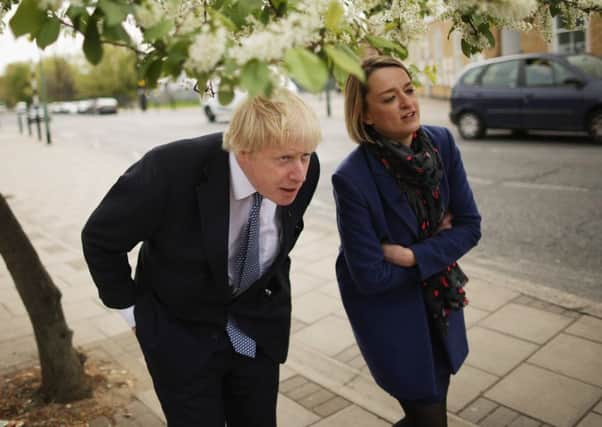Dani Garavelli: Blasé BBC brings out worst in web trolls


The petition against the National 5 Maths exam had gathered hundreds of signatures before my son made it home from school. Even he thought the idea was stupid, though he’d added his name “for the bantz”. As for me, I was on my high horse. Teenagers today are so petulant. A few tricky questions and they’re flouncing off to the SQA. When will they learn you don’t always get to dictate the terms?
But the whingeing school pupils were only copying their elders. They have grown up in the age of the online petition. Don’t like what someone has said or done? Stick your autograph on a website and get them banned. Is it really too much to expect that everyone else reflects your own world view?
Advertisement
Hide AdAdvertisement
Hide AdWhich brings me – rather circuitously – to Laura Kuenssberg. She is the latest victim of the great BBC bias hoo-haa. The first female political editor in the corporation’s history, you might think she’d be lauded for holding her own in a world where – as Isabel Hardman can testify – women are still dismissed as “totty.” Instead, 35,000 people called for her to be fired for her perceived anti-Jeremy Corbyn agenda.
She is not the first BBC journalist to face such antipathy. Nick Robinson and James Cook were both hounded for their coverage of the independence debate. Being a woman, abuse directed at Kuenssberg came with a side-order of sexism – misogynist comments that last week caused online campaign group 38 Degrees to take the petition down. But then Robinson – who was diagnosed with cancer – had to face tweets suggesting he’d benefit from a dose of chemotherapy. When the anti-bias brigade works itself up into a lather, no journalist gets off lightly. And why should they? They have committed a cardinal sin, challenging ideas others hold sacred.
Anyone who has worked in the media in Scotland knows a piece which is in harmony with its audience’s views is “incisive” and “well-written” and anything that isn’t is “skewed” and “bigoted”. We have all been “SNP propagandists” one week and “unionist stooges” the next; it’s annoying, but you plough on. It does make you warm to those getting a hard time elsewhere, though.
Google “bias at the BBC” and you’ll see the corporation’s been accused of more or less everything in its time. It was anti-Thatcher (but also anti the miners). It’s been pro-Israel, but also pro-Palestinian. It’s too left-wing, too right-wing, too liberal. It tried to undermine the case for Scottish independence.
The most recent accusation is that the corporation is trying to bring down Corbyn. You might think he is doing quite a good job of that on his own, but I am impartial and couldn’t possibly comment. Earlier this year, 57,000 people signed a petition complaining the BBC kept labelling him “left-wing”.
Kuenssberg first became embroiled in this row when it emerged she had helped persuade shadow foreign affairs minister Stephen Doughty to announce his resignation during a BBC interview; this was seen as a motivated by a desire to embarrass the Labour leader when it was more likely to have been motivated by a desire for a scoop.
Critics have also been cataloguing her tweets, calling her out when she focuses on a Labour story – like the shadow cabinet reshuffle – over the other events of the day.
The petition that was taken down was driven by what the organisers described as a “focused tirade” against Corbyn and Labour. For this, she found herself described as a “bitch” and a “c***”, and told she should be sacked.
Advertisement
Hide AdAdvertisement
Hide AdOf course, just because they’re paranoid, doesn’t mean the BBC is not out to get them, so allegations of bias should be scrutinised. Let’s look at one of the most prevalent: that the BBC spent an inordinate amount of time on Labour’s anti-Semitism row while ignoring the story of possible Tory electoral fraud.
There may be some truth in this. But then many people don’t understand how news works. The anti-Semitism row was the consummate story. Ken Livingstone made his comments on a public forum, John Mann harangued him in a public forum. There was conflict; there was footage of conflict. The electoral fraud story on the other hand – while potentially huge – consists of as yet unproven allegations. Too much speculation could have serious repercussions. Which is not to say the BBC should not be paying it more attention, just that its failure to do so may not be politically motivated.
What the BBC is guilty of is not so much bias, but complacency. It’s so embedded in its Metropolitan bubble, it finds it difficult to relate to events outside its narrow frame of reference. Hence its inability to grasp the changes wrought by the referendum. Or to ask itself what it could be doing better.
This could be seen on last week’s Question Time, filmed in Aberdeen, when David Dimbleby appeared to regard Scots as a mystifying species. As the guests debated Conservative gains and Labour’s evisceration, he wore a look of amused disdain; and he hadn’t done even cursory research on the Named Person provision. It requires a certain kind of arrogance for the presenter of a political panel show not to at least Google a policy which is one of the hottest topics in the country.
I won’t be starting a petition to have Dimbleby sacked. Just because he didn’t do things the way I’d choose doesn’t give me the right to demand he lose his job. But it would be good if the BBC could occasionally reflect on its own limitations, especially when it comes to news coverage; then perhaps the accusations of bias would be less prolific and gain less traction.